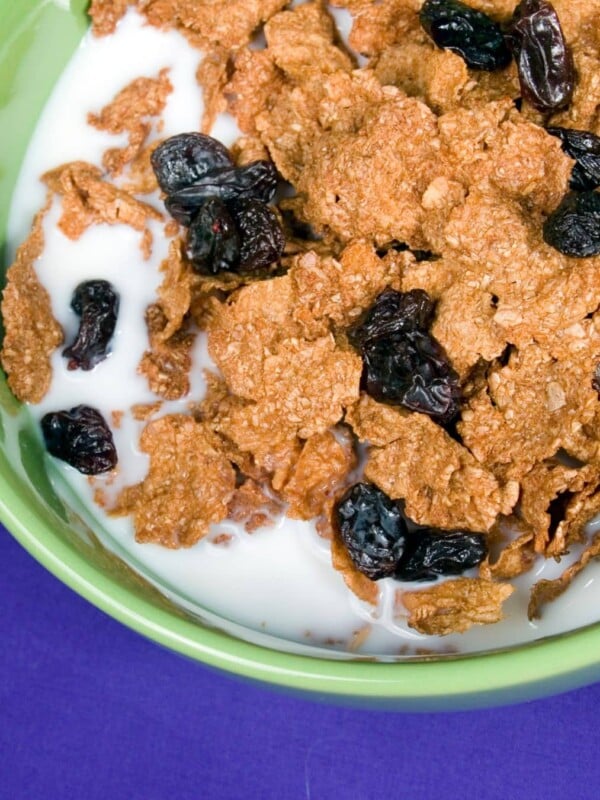This post may contain affiliate links. Please read our disclosure policy.
As a dietitian I totally understand the struggle to get enough fiber in your day, and fiber gummies seem like a reasonable solution. You may be wondering: do fiber gummies work?
In this blog post, we’ll explore what fiber gummies are, how effective they are compared to natural fiber sources, their potential health benefits, and any drawbacks you should be aware of. We’ll also share other practical ways to increase your fiber intake.
By the end, you’ll have a well-rounded understanding to help you make informed decisions about incorporating fiber gummies into your diet. Let’s get into it.

What Are Fiber Gummies?
Fiber gummies are dietary supplements designed to provide a convenient source of fiber in a chewable, gummy form. Unlike traditional fiber supplements like powders or capsules, fiber gummies offer a tasty and easy way to increase your daily fiber intake.
They usually contain soluble fiber, which dissolves in water to form a gel-like substance that helps regulate digestion. Fiber gummies are big business in the United States. In 2022, fiber gummies were a 4.4 billion dollar industry.
It can be a challenge to meet daily fiber needs, so it’s only natural to look for shortcuts. But the big question remains—do fiber gummies really work?
Common Ingredients in Fiber Gummies
Most fiber gummies are made from ingredients like soluble fiber (such as inulin or pectin), natural flavors, sweeteners, and sometimes vitamins or minerals.
Some popular brands include:
Each brand may offer variations with different flavors and additional nutrients.
Different Brands and Variations
The market for fiber gummies is diverse, and every brand is different. Some brands focus on providing a pure fiber supplement, while others combine fiber with other beneficial ingredients like probiotics or vitamins. For example, the SmartyPants brand is a combination of a vitamin supplement and fiber supplement.
It’s always important to read the labels and understand the specific benefits each brand offers to choose the one that best suits your needs.
PS if gummies aren’t for you, a simple psyllium husk powder like Metamucil could be a good option as well.
Analyzing Their Effectiveness
How Fiber Gummies Function
Fiber gummies work similarly to natural fiber sources to improve bowel habits and support your digestive system by supporting your gut bacteria (the good bacteria feeds on fiber!). However, the types of fiber in gummies can differ from those found in whole foods.
Most fiber gummies provide solely soluble fiber vs insoluble fiber. Soluble fiber helps to slow digestion, stabilize blood sugar levels, and lower cholesterol.
Recommended Dosage
The recommended amount of fiber to consume each day is about 25 grams for women and 38 grams for men.
Spoiler: Many, many people do not eat enough fiber each day.
Most fiber gummies provide around 3-5 grams of fiber per serving. While they can provide a boost to get you closer to your goal, you won’t be able to meet your fiber needs through fiber gummies alone.
What do the studies say?
Research on fiber supplements, including gummies, suggests they can be effective in promoting digestive health and regularity. And while not unique to fiber from gummies, having enough fiber can reduce risk of heart disease, support weight loss, promote diversity in your gut microbiome, and, of course, reduce constipation.
Potential Health Benefits
Digestive Health and Regularity
Fiber is crucial for maintaining digestive health. It helps prevent constipation by adding bulk to your stool and promoting regular bowel movements.
Constipation is incredibly common in US adults; nearly 1 in 5 adults are constipated. Fiber gummies might be beneficial for individuals who struggle to get enough fiber from their diet alone.
Weight Management and Satiety
Fiber can aid in weight management by promoting feelings of fullness and reducing overall calorie intake. By slowing digestion, fiber helps control blood sugar levels and prevents overeating.
Fiber gummies can be a convenient way to support these benefits, but it’s important to keep in mind that the fullness factor will likely be different from eating a serving of fiber gummies versus a whole food fiber source, like an apple.
Additional Health Benefits
Beyond digestive health and weight management, fiber has been linked to other health benefits, such as lowering cholesterol levels and stabilizing blood sugar. These effects can contribute to a reduced risk of chronic diseases like heart disease and diabetes.

Possible drawbacks
Common Side Effects
While fiber gummies are generally safe, they can cause side effects like bloating, abdominal discomfort, gas, and stomach cramps, especially when consumed in large quantities.
If you’re going to take fiber gummy supplements, I recommend that you start with a small dose and gradually increase it to allow your body to adjust.
Plus, always make sure that you’re well-hydrated. Having more fiber than you’re used to without enough water is an unfortunate recipe for gastrointestinal symptoms and even constipation.
Nutritional Limitations
Fiber gummies lack the many additional vitamins, minerals, and phytochemicals found in high-fiber foods like fruits, vegetables, nuts, seeds, and beans. These whole foods provide a broader range of nutrients that support overall health in addition to the fiber that they provide.
Overconsumption Concerns
Some fiber gummies are pretty tasty, but overconsumption of fiber supplements can lead to digestive discomfort like bloating and gas. Too much fiber is not better. It’s crucial to follow the recommended dosage and increase fiber intake slowly, accompanied by plenty of water to aid digestion.
Added sugar & other sweeteners
Many fiber gummies have added sugar or another sweetener, so that’s something to be mindful of too.
Alternatively, some of the sweeteners have xylitol or other non-nutritive sweeteners. While they may offer a sweet taste and less sugar, they do cause stomach pain and digestive discomfort for some people – another reason not to overdo things with any supplement, including a fiber gummy.
Cost
Getting fiber from a supplement can be pricey, especially since it’s only giving you a few grams. You get way more bang for your buck from Whole Foods, both cost-wise and with nutrition.
At my local grocery store, the Metamucil fiber gummies end up costing $0.75 per day or about $275 per year.
Let’s talk about ways to increase your fiber on a daily basis.
Other Ways to Increase Fiber Intake
Eat More Fruits and Vegetables
Not only are fruits and vegetables full of vitamins and minerals, but they’re high in fiber too. Include more fruits and veggies at meals and snacks for an easy fiber boost.
For example, a medium sized apple has about 4-5 grams of fiber, and a cup of raspberries has 8 grams of fiber.
If you need some fun new ways to eat more veggies, try my Crispy Feta Brussels Sprouts with Balsamic or my Healthy Cowboy Caviar!
Choose High-Fiber Grains
Whole grain foods are a high fiber food, too. Choose foods like whole grain bread, whole grain crackers, whole wheat pasta, and oats.
Check out our detailed guides on the best high-fiber cereals and breads from a dietitian:
Eat more legumes
Chickpeas, lentils, beans, peas, and soybeans are all excellent sources of fiber. A 1/2 cup of chickpeas has 6 grams of fiber, and a 1/2 cup of cooked lentils has 7 grams of fiber. Boost your legume intake with my easy Ground Chicken Chili Recipe or my Cucumber Chickpea Salad.
Include Nuts and Seeds
Nuts and seeds are not only rich in fiber but also provide healthy fats and protein. Adding a handful of almonds or a tablespoon of chia seeds, or flaxseeds to your meals can significantly increase your fiber intake.
Some of my favorite recipes to boost my fiber intake with chia seeds are my Coffee Chia Protein Pudding and High Fiber Smoothie Recipe.

That’s a wrap
Prebiotic fiber gummies can be a convenient and tasty way to supplement your dietary fiber intake and gut health, especially for those who struggle to consume enough fiber through their diet alone. They may offer several health benefits, including improved digestive health.
However, they should not replace whole foods, which provide a broader range of nutrients essential for overall health. The best way to incorporate these gummies is by combining them with a balanced diet.
And remember, any dietary supplement including fiber gummy vitamins is not regulated by the Food and Drug Administration, so always check with your healthcare provider before starting one (especially if you have any medical conditions).
If you’re considering adding fiber gummies to your routine, for best results start with a small dose and gradually increase it, ensuring you drink plenty of water. For a well-rounded approach to increasing your fiber intake, combine fiber gummies with fiber-rich foods like fruits, vegetables, legumes, whole grains, nuts, and seeds.
Interested in learning how to cook delicious, easy, and satisfying meals without spending all day in the kitchen? Check out my ebook, “Easy Balanced Bites,” for 30 balanced recipes and six weeks of grocery lists to simplify your meal planning and keep you nutritionally satisfied. Get your copy here: Easy Balanced Bites.
More to read
I love reviewing products and covering nutrition topics! You also might like these articles:













